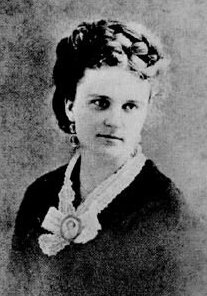Kate Chopin | |
|---|---|
 Chopin in 1894 | |
| Born | Katherine O'Flaherty February 8, 1850 St. Louis, Missouri, U.S. |
| Died | August 22, 1904 (aged 54) St. Louis, Missouri, U.S. |
| Occupation | Novelist, short story writer |
| Genre | Realistic fiction |
| Notable works | The Awakening |
| Spouse |
|
| Children | 6, including Oscar Chopin |
| Signature | |
 | |
Kate Chopin (/ˈʃoʊpæn/,[1][2] also US: /ʃoʊˈpæn, ˈʃoʊpən/;[3] born Katherine O'Flaherty; February 8, 1850[4] – August 22, 1904)[5] was an American author of short stories and novels based in Louisiana. She is considered by scholars[6] to have been a forerunner of American 20th-century feminist authors of Southern or Catholic background, such as Zelda Fitzgerald, and she is among the most frequently read and recognized writers of Louisiana Creole heritage. She is best known today for her 1899 novel The Awakening.
Of maternal French and paternal Irish descent, Chopin was born in St. Louis, Missouri. She married and moved with her husband to New Orleans. They later lived in the country in Cloutierville, Louisiana. From 1892 to 1895, Chopin wrote short stories for both children and adults that were published in national magazines, including The Atlantic Monthly, Vogue, The Century Magazine, and The Youth's Companion. Her stories aroused controversy because of her subjects and her approach; they were condemned as immoral by some critics.
Her major works were two short story collections and two novels. The collections are Bayou Folk (1894) and A Night in Acadie (1897). Her important short stories included "Désirée's Baby" (1893), a tale of an interracial relationship in antebellum Louisiana,[7] "The Story of an Hour" (1894),[8] and "The Storm" (written 1898, first published 1969).[9][7] ("The Storm" is a sequel to her "At the 'Cadian Ball" (1892), which appeared in Bayou Folk, her first collection of short stories.)[7]
Chopin also wrote two novels: At Fault (1890) and The Awakening (1899), which are set in New Orleans and Grand Isle, respectively. The characters in her stories are usually residents of Louisiana, and many are Creoles of various ethnic or racial backgrounds. Many of her works are set in Natchitoches in north-central Louisiana, a region where she lived.
Within a decade of her death, Chopin was widely recognized as one of the leading writers of her time.[10] In 1915, Fred Lewis Pattee wrote "some of [Chopin's] work is equal to the best that has been produced in France or even in America. [She displayed] what may be described as a native aptitude for narration amounting almost to genius."[10] She was not related to famous Polish composer Frederic Chopin as some may believe but she did have a son named Frederick Chopin, who was probably named after the composer.
- ^ "Chopin, Kate". Lexico UK English Dictionary. Oxford University Press. Archived from the original on May 16, 2021.
- ^ "Chopin". The American Heritage Dictionary of the English Language (5th ed.). HarperCollins. Retrieved July 23, 2019.
- ^ "Chopin". Merriam-Webster.com Dictionary. Merriam-Webster. Retrieved July 23, 2019.
- ^ "Frequently Asked Questions about Kate Chopin". KateChopin.org.
- ^ Barton, Gay (1999). "Chopin, Kate O'Flaherty". American National Biography (online ed.). New York: Oxford University Press. doi:10.1093/anb/9780198606697.article.1600295. (subscription required)
- ^ Nilsen, Helge Normann. "American Women's Literature in the Twentieth Century: A Survey of Some Feminist Trends", American Studies in Scandinavia, Vol. 22, 1990, pp. 27–29; University of Trondheim.
- ^ a b c William L. (Ed.) Andrews, Hobson, Trudier Harris, Minrose C. Gwwin (1997). The Literature of the American South: A Norton Anthology. Norton, W. W. & Company. ISBN 978-0-393-31671-1.
{{cite book}}: CS1 maint: multiple names: authors list (link) - ^ Chopin, Kate. The Story of an Hour.
- ^ "The Storm, Kate Chopin, characters, setting, questions". KateChopin.org. The Kate Chopin International Society. Retrieved January 28, 2023.
- ^ a b Fred Lewis Pattee. A History of American Literature Since 1870. Harvard University Press. p. 364.